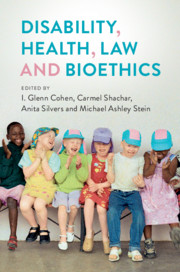Book contents
- Disability, Health, Law, and Bioethics
- Disability, Health, Law, and Bioethics
- Copyright page
- Dedication
- Contents
- Notes on Contributors
- Introduction
- Preface
- Acknowledgments
- Part I Disability: Definitions and Theories
- Part II Disability in the Beginning and the End of Life
- Part III Disability in the Clinical Setting
- Part IV Equality, Expertise, and Access
- Part V Disability, Intersectionality, and Social Movements
- Introduction to Part V
- 14 Destigmatizing Disability in the Law of Immigration Admissions
- 15 The Normative Bases of Medical Civil Rights
- 16 Judicial Representation: Speaking for Others from the Bench
- Part VI Quantifying Disability
Introduction to Part V
from Part V - Disability, Intersectionality, and Social Movements
Published online by Cambridge University Press: 08 April 2020
- Disability, Health, Law, and Bioethics
- Disability, Health, Law, and Bioethics
- Copyright page
- Dedication
- Contents
- Notes on Contributors
- Introduction
- Preface
- Acknowledgments
- Part I Disability: Definitions and Theories
- Part II Disability in the Beginning and the End of Life
- Part III Disability in the Clinical Setting
- Part IV Equality, Expertise, and Access
- Part V Disability, Intersectionality, and Social Movements
- Introduction to Part V
- 14 Destigmatizing Disability in the Law of Immigration Admissions
- 15 The Normative Bases of Medical Civil Rights
- 16 Judicial Representation: Speaking for Others from the Bench
- Part VI Quantifying Disability
Summary
“What we owe to each other” is a question that consumed the philosopher T. M. Scanlon, and more recently has been the focus of the popular sitcom The Good Place. This question can be framed very broadly: how does each individual in society interact with everyone else? This question can also be the launching point for a narrower inquiry: in light of unique circumstances, what does society owe its members, such as disabled individuals? Even more specifically, how do we translate what is “owed” disabled individuals into a regulatory regime that can carry out these obligations? The question of what is owed is especially important when considering our legal system because, generally, to provide an individual with a right means to impose an obligation on another actor.
- Type
- Chapter
- Information
- Disability, Health, Law, and Bioethics , pp. 185 - 186Publisher: Cambridge University PressPrint publication year: 2020



